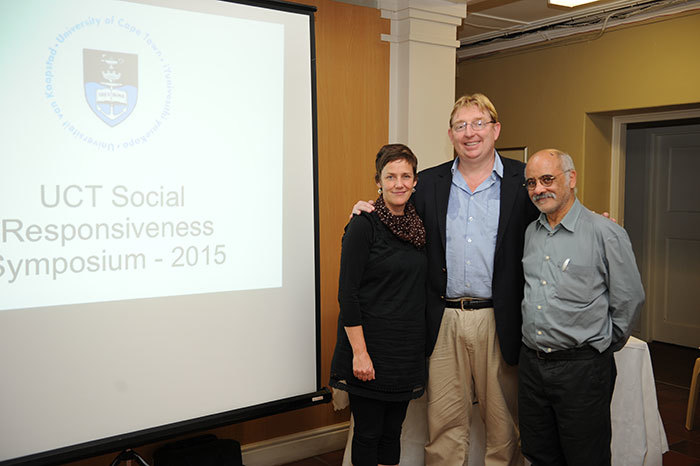2013-2014 Social Responsiveness Report: recognising staff and students
30 March 2015 | Story by Newsroom
For the first time, UCT's Social Responsiveness Report recognised the role of students and the university's professional and support staff (PASS), as well as that of academics, in creating positive social change in the wider community.
Page through the 140-page 2013-2014 Social Responsiveness Report and you will come across descriptions of hundreds of individuals – academic staff, professional and support staff and students – united by a common purpose: the desire to make things better within the wider community of Cape Town.
Speaking at the launch of the 2013-2014 report, held on Thursday 26 March 2015, Deputy Vice-Chancellor Prof Crain Soudien made it plain that he believes social responsiveness plays an essential role in ensuring that the university is not, as he put it, "negligent of its context".
"Over the last seven years the University Social Responsiveness Committee (USRC) has grappled with the question of what a university is for. In attempting to find new modalities, paradigms and approaches to answering this question I believe we have underscored the need to engage deeply with the context in which we find ourselves, to think about our relationship to the kinds of knowledge we teach. I think within this exists incredible opportunity."
Judy Favish, director of the Department of Institutional Planning, explained that the social responsive awards were started five years ago as a way to recognise engaged scholarship. "The criteria for an award are very strict: an activity that is awarded must show a contribution to teaching and research projects, as well as reciprocity and mutuality. In other words, the individual in question must have shown a long history of engaging the partner or partners in the project to mutual benefit. To receive such an award, an individual must also be working within their own discipline."
The 2014 Vice-Chancellor's Social Responsiveness Awards recognised the work of two UCT academics: Stuart Hendry, who heads up DUNE (the Faculty of Commerce's Development Unit for New Enterprise), and Associate Professor Sophie Oldfield, of the Department of Environmental and Geographical Sciences, who won the award in recognition of her decade-long collaboration with Gertrude Square and the Valhalla Park United Front Civic Organisation. Hendry went on to present the work of the Starting Chance campaign, for which the award was granted, which aims to upgrade 30 shack-based crèches into formal centres of excellence for early childhood development.
The 2013-2014 Social Responsiveness Report differed in the fact that for the first time, it pays tribute to the contributions of the university's professional and support staff to skills-based social responsiveness and to the civic engagement of students volunteering within campus organisations. The report features the contributions of almost a dozen projects – drawn from such diverse fields as law, information science and skills development for young women – involving PASS staff. At the launch, Dr Reggie Raju, head of UCT Libraries, was on hand to explain the extraordinary variety of community projects with which the library staff engage, from extra-curricular contributions to school libraries in poor communities to the role staff play in professional bodies such as LIASA (the Library and Information Society of South Africa).
Also on hand on the day were two student leaders of on-campus volunteer organisations featured in the report. Ayanda Nxusani reflected on the role of student activism through Amnesty International UCT, followed by Rebecca Freund who described the work of UCT's chapter of Equal Education.
Lastly, Sonwabo Ngcelwane of the Social Responsiveness Unit gave an overview of the breadth and depth of faculty activities captured in the 2013-2014 report, pointing out that it demonstrates the huge contributions that UCT academics are making, particularly in the areas of policy and knowledge dissemination and integration.
Read the full report at socialresponsiveness.uct.ac.za/reports
Story by Ambre Nicolson. Photo by Michael Hammond.
 This work is licensed under a Creative Commons Attribution-NoDerivatives 4.0 International License.
This work is licensed under a Creative Commons Attribution-NoDerivatives 4.0 International License.
Please view the republishing articles page for more information.










